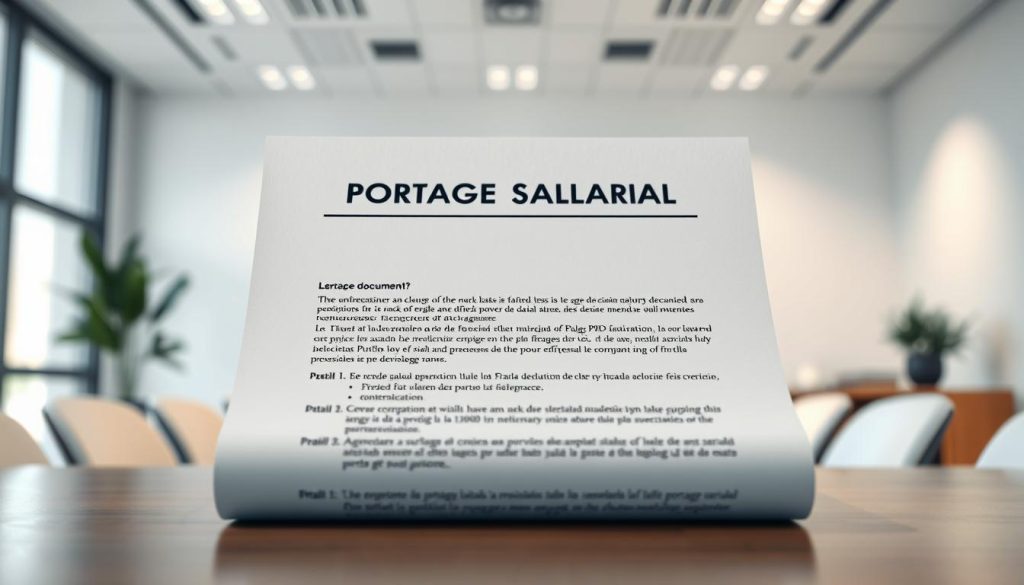Portage salarial is a modern, simple way to work as an expert while keeping the benefits of a salaried life. It lets you sell your skills without creating a company. A société portage invoices clients, handles admin, and pays you a monthly salary.
In this tripartite setup, the consultant, the société portage salarial, and the client company share roles. You choose missions and set rates. The company covers billing, social charges, and a guarantee financière if needed.
This model keeps your independence tout conservant the safety of the French social model. As a salarié porté you get payslips, protection sociale, and chances to access training and networks like Cadres en Mission.
Expectations: after social contributions and frais gestion, net pay is typically near 50% of your chiffre d’affaires HT. Rules include a minimum TJM of €300 HT and regulated guarantees for wages and contributions.
Table of Contents
Key Takeaways
- Work independently while keeping a statut salarié and social protection.
- A société portage handles invoicing, admin, and payroll.
- Typical take-home pay is about 50% after charges and fees.
- Minimum TJM is €300 HT and a guarantee financière protects wages.
- Good for testing business ideas, scaling safely, or easing a job-to-freelance transition.
What is portage salarial and why it matters today
A hybrid work model now lets experts keep commercial freedom while gaining employee protections.
Portage salarial is simple in practice: you sign a contract with a company that invoices clients, you set missions and rates, and you receive a salary. This lets you run as a freelancer while enjoying the safety of a statut salarié.
The idea started in the late 1980s and won legal clarity through laws in 2008 and 2015. The convention collective of 2017 (IDCC 3219) and the code travail (Art. L1254‑1 and L1254‑2) now define rights and duties.
Today thousands of consultants, trainers, and IT experts choose this route. Salariés portés value fast market access, lower admin, and full employee benefits like unemployment cover and retirement contributions. Your couverture sociale mirrors a classic employment contract.
| Feature | What it gives you | Why it matters |
|---|---|---|
| Contract model | Company invoices, you are paid | Less admin, faster start |
| Legal basis | Code du travail & convention collective | Clear rights and protections |
| Social protection | Employee-like coverage | Security while staying independent |
Next we will unpack the tripartite model, the contracts and the legal safeguards that make this approach practical for many experts.
How the tripartite model operates
The three-way arrangement links the consultant, the umbrella company, and the client in clear operational roles.
Who does what:
- Salarié porté: you negotiate the mission, set the TJM, and deliver the work with full autonomy.
- Société de portage: acts as employer, signs the contrat prestation with the entreprise cliente, and handles payroll and declarations.
- Entreprise cliente: pays for the service and receives the deliverables without hiring you directly.
From negotiation to monthly pay
You negotiate scope, duration, and daily rate with the entreprise cliente. The société portage then formalizes the service contract and invoices the client.
The company that invoices receives payment, deducts fees and social contributions, and issues your salary each month. Salary timing follows the payment terms set in the contrat prestation.
« You keep commercial freedom while the employer-provider ensures legal and fiscal compliance. »
Admin relief and visibility: the société portage manages invoicing, payroll, and all declarations so you can focus on consulting. Many firms offer a real‑time compte d’activité to track billed vs. paid amounts and salary room.
| Actor | Main role | Benefit to consultant |
|---|---|---|
| Salarié porté | Deliver missions | Independence + social cover |
| Société portage | Admin & payroll | Less gestion administrative |
| Entreprise cliente | Receive service | Access expert without employer risk |
Result: you retain control of methods and schedules while benefiting from an employer framework that handles compliance and payments.
The legal framework and collective agreement
French law and a sector-specific collective agreement create the legal scaffolding that protects consultants and clients alike.
Code du travail and the 2017 convention
The model rests on the Code du travail, notably articles L1254‑1 and L1254‑2, and the 2017 convention collective (IDCC 3219). These texts formalize rights, duties, and employer obligations.
No subordination and what it means
There is no legal subordination to the client: you keep control of methods, schedule, and technical choices. This independence limits employer-like liability from the client side.

Guarantees, insurance and sector governance
All sociétés portage must hold a garantie financière to secure wages and social charges if the company defaults. The employer-operator also arranges professional insurance and responsabilité civile tied to the mission.
Membership in PEPS and AFNOR labels raise transparency and trust. For clients, this framework offers vetted experts, clearer procurement, and easier banking relationships.
« Standardized contracts and collective rules reduce disputes and clarify recourse paths. »
Practical effect: these legal instruments spread risk, ensure pay and contributions, and strengthen confidence for both consultants and client companies.
The three contracts that structure your activity
To operate smoothly as a salarié porté, you rely on a clear set of contractual documents.
Convention d’adhésion: entering the network
The convention portage formalizes your entry. It lists fees, reimbursement rules, and payment cadence.
You can sign this agreement before your first mission to access training and network benefits.
Contrat de prestation: mission scope and branding
For each mission, the société portage signs a contrat de prestation with the client.
The document defines scope, deliverables, duration, cost and can even include your logo on reports.
Contrat travail (CDD or CDI): rights and terms
Your contrat travail with the umbrella company sets employment rights under the collective agreement.
CDD contracts include a 10% end-of-contract premium; CDI contracts often keep a 10% reserve between missions.
« Clear contracts protect your pay and simplify client procurement. »
How pay works: invoiced revenue funds salary chaque mois; the société portage handles social contributions and payroll compliance.
- Verify clauses on expenses, training, and insurance.
- Check cross-references to the convention collective for consistency.
| Contract | Main purpose | What to check |
|---|---|---|
| Convention d’adhésion | Entry rules & fees | Payment cadence, refunds, training access |
| Contrat de prestation | Mission terms | Scope, duration, price, branding |
| Contrat travail | Employment rights | CDD/CDI clauses, reserves, prime |
Who can benefit from portage salarial
For consultants and specialists, this framework offers a practical bridge between freelance freedom and salaried security. It matches many career stages and professional profiles.
Eligibility
Basic rule: a Bac+2 diploma or at least three years’ relevant experience is usually required.
You must offer an intellectual or professional service and be able to find clients and negotiate terms independently.
Typical profiles
Common candidates include strategy and HR consultants, IT developers, cybersecurity experts, trainers, and transition managers.
Multilingual consultants can use this route to serve cross-border clients with confidence.
Who else benefits
- Jeunes diplômés: a safe first market entry with training access and employee-level coverage.
- Active retirees: continue to exercer activité and combine income with pensions under rules that apply.
- Career changers: test a reconversion and validate a business idea before creating a company.
| Profile | Why it fits | Practical note |
|---|---|---|
| Salarié porté | Credibility with clients and institutions | Good for billing as an employee |
| Jeunes diplômés | Training, networks, lower risk | Build portfolio and client references |
| Active retirees | Flexible work and added income | Check pension compatibility rules |
| Career changers | De-risk reconversion | Try missions before forming a company |
Income expectations: targets often aim for a net near €2,000+ per month depending on missions and fees. Use your société portage salarial network to find offers and peer support. Certifications and a clear portfolio help position you as a strong salarié porté.
Core advantages: social protection and peace of mind
Choosing the umbrella employment route gives consultants tangible social protections and steady administrative support.
Full social coverage means you keep santé protections similar to classic employment. You benefit from sécurité sociale reimbursements, assurance maladie coverage, and retirement contributions deducted and declared by the employer-provider.
Daily sick allowances and other avantages sociaux apply when rules are met. In many cases you can also combine unemployment benefits or pension income with your consulting pay under specific conditions.

Sécurité sociale, unemployment eligibility, and retirement contributions
Your payslips show social deductions and contributions to retirement schemes. Eligibility for chômage depends on declared activity and billing history.
Professional liability coverage
The société portage typically provides assurance responsabilité civile professionnelle (RC Pro) to cover claims tied to mission delivery.
Responsibility coverage protects contracts but does not remove your personal duty of care. It complements, not replaces, professional diligence.
Training access, network effects, and local support
Many employers in this model offer funded training paths and commercial workshops to sharpen your offer.
Local advisors and regional teams help with contracts, client issues, and career advice. Networks of salariés portés create referrals, teaming opportunities, and co-bids on larger projects.
« This setup permits freedom to set your agenda while the employer framework secures base protections and lowers admin burden. »
- Social coverage: sécurité sociale, assurance maladie, retirement contributions, and possible unemployment rights.
- Avantages sociaux: sick-leave allowances and combined-income options in some cases.
- Assurance responsabilité civile: RC Pro provided by the société portage to protect missions.
- Training & support: certifying courses, sales coaching, and regional HR contacts.
Fees, salary net, and how revenue converts from chiffre d’affaires
Understanding the flow from your invoice to the payslip helps you price work and predict income.
Frais de gestion usually sit between 7% and 10% of your chiffre d’affaires HT. These fees fund admin, payroll, legal support, insurance, training access, and the digital tools a société portage salarial provides.
From CA HT to your salaire net, money follows a clear path: the client pays the invoice, the société deducts frais de gestion, employer and employee social contributions are applied, and the remainder appears as salary on your payslip chaque mois.
As a rule of thumb, expect roughly 50% of your CA HT as take‑home pay after charges and fees. This varies with your deductible frais professionnels, contract type and chosen benefits.
The collective agreement and recent amendments set required elements: a 5% apport d’affaires, a 10% ICCP, a 10% CDD premium when relevant, and a 10% reserve for CDI gaps. The minimum TJM is €300 HT to keep the model sustainable.
| Item | Typical rate | Purpose |
|---|---|---|
| Frais de gestion | 7–10% | Admin, payroll, legal, insurance, tools, training |
| Employer & employee contributions | ~40–45% | Social charges that fund santé, retraite, chômage |
| Apport d’affaires / ICCP / reserves | 5–10% each | Business development, compensation smoothing, contract rules |
| Net to salarié porté | ~50% | Average take‑home after all deductions |
Good practice: run a simulator, compare sociétés on what frais de gestion include, and track client payment terms. That will protect cash flow and help you optimize net income.
Administrative relief: what the société de portage handles
A reliable umbrella company removes the paperwork so you can spend time selling and delivering work. For many consultants, that shift is the core advantage of portage salarial.
Invoicing, payroll, declarations, and compliance
Key tâches administratives removed from your plate:
- Invoicing and client accounting
- Payroll preparation and payslips
- Social declarations and tax filings
- Compliance monitoring and reserve management
Visibility with a real-time account of activity
Most société portage offer a real-time account to track billed amounts, incoming payments, reserves, and salary capacity. This dashboard lets a salarié porté plan pay and cash flow.
Time saved is money earned: you can reinvest hours into prospecting to développer activité or into mission delivery.
« Less admin means more client focus and faster growth. »
| Service | Benefit | Result |
|---|---|---|
| Payroll & declarations | Employer-grade accuracy | Fewer penalties, smoother filings |
| Real-time account | Clear visibility | Better planning and scaling |
| Commercial coaching | Improve collection and contracts | Higher revenue opportunities |
portage salarial international
A French employment arrangement can let you work abroad while keeping your protections at home.

Detachment without losing French social coverage
Detachment means you remain under the French system while on foreign missions. Your French employer files the paperwork so you keep couverture sociale and related rights.
You typically retain sécurité sociale, assurance maladie, unemployment, and pension contributions during the period of detachment.
Two practical scenarios
- Serve foreign clients from France: work remotely for companies outside France while staying on French contracts.
- Take assignments abroad: short or mid‑long missions where the employer organizes détachement and continues declarations in France.
The société portage salarial manages A1 certificates, visas input, and compliance to avoid double contributions. RC Pro and mutual coverages are usually extended to international work by agreement.
« Adapting your TJM for travel, currency and risk helps protect margins when you work across borders. »
| Topic | Practical note | Action |
|---|---|---|
| Social coverage | Keep French rights during detachment | Request A1 and employer filings |
| Insurance | RC Pro and mutuelle often extend abroad | Confirm limits and add riders if needed |
| Contracts & language | Bilingual clauses and governing law choices | Draft clear mission addenda |
| Pricing | Adjust TJM for expenses and risk | Ask portage advisor for rate guidance |
Planning is key: allow lead time for A1 forms, visas, and client onboarding. A well-prepared détachement opens markets while letting a salarié porté keep French protections and grow internationally.
Finding and winning missions as a salarié porté
To secure work as a salarié porté, begin by sharpening who you serve and the outcomes you deliver. Clear positioning makes outreach simpler and faster.
Positioning, prospecting, and negotiation
Positioning: define your services, signature results, and two ideal client profiles for your activité consultant.
Prospecting routine: use weekly outreach, content pieces, events, and platforms to trouver missions on a steady basis.
Negotiation: align scope, deliverables, governance, and payment terms before signing. Be explicit on TJM and reimbursable expenses.
Leveraging mission boards, networks, and training
Many société portage salarial publish mission offers and run workshops on negotiation and sales. Use those boards to spot leads quickly.
Tap networks of salariés portés for referrals and co-bids. Team-ups help win larger contracts and speed market access.
- Keep case studies, references, and certifications to boost credibility for your activité consultant.
- Use a simple CRM and a steady follow-up cadence to développer activité sustainably.
- Ask your société portage salarial to review contracts and help clear procurement hurdles.
Remember: even as a tant salarié you remain responsible for finding work. Treat the umbrella relationship as support, not guaranteed income.
How to choose the right société portage salarial
Choosing a reliable umbrella company affects how much you keep and how well you are protected. A few targeted checks will help you pick a partner that boosts your salaire net and reduces surprises.
Frais de gestion, hidden costs, and net salary optimization
Compare advertised frais gestion (typically 7–10%) and ask what they cover. Low rates can hide extra charges for payslip processing, insurance riders, or contract templates.
Clarify rules for frais professionnels, VAT restitution, and expense reimbursement. These policies directly affect your net income.
Ask for a sample simulation of an invoice-to-salary flow so you can compare real take‑home pay across firms.
Financial strength, labels, PEPS membership, and tools
Verify the employer’s financial solidity: size of the garantie financière, audited accounts, and track record with client non‑payment.
Look for credibility signals: PEPS membership, AFNOR or similar labels, public ratings, and named guarantees (some companies publish large guarantee figures).
Test digital tools: real‑time dashboards, salary simulators, contract templates and integrations that simplify accounting.
Accompaniment quality: legal, commercial, and training support
Prioritize firms that offer legal contract review, active commercial coaching, and a relevant training catalogue. These services boost your market value and protect you from risky clauses.
Evaluate network vibrancy: mission boards, events, and active communities help you find clients faster.
« Choose the société portage that maximizes your net pay while ensuring clear contracts and solid financial cover. »
| Check | Why it matters | What to ask |
|---|---|---|
| Frais gestion scope | Impacts salary net | What is included? Any extras? |
| Expense & VAT policy | Improves net income | How are expenses handled and VAT reclaimed? |
| Guarantee & labels | Protects wages and reputation | Size of garantie financière; PEPS/AFNOR status? |
| Tools & support | Saves time, improves sales | Dashboard, simulator, legal review, training? |
Final tip: when you choose société portage, sign only after a transparent simulation shows your expected salaire net and after you confirm contract clauses on reserves, ICCP, and payment timing.
Industries, activities, and limits
Intellectual services are the core market: consulting, IT, training and communication thrive under this employment model.

High-demand domains
Top areas include strategy and operations consulting, HR and change management, IT development and cybersecurity, plus professional training and finance advisory.
Typical entreprise cliente profiles
Clients range from large groups and mid-market firms to public bodies and educational institutions that need expertise without hiring permanent staff.
Non-eligible activities and why
Some activities cannot be carried out: regulated professions (lawyers, architects, notaries, doctors), services à la personne, and buy-sell commercial trades.
The reason is legal scope and insurance limits: professional rules and market risk block these uses, and RC obligations differ for regulated roles.
Compliance boundaries and good practice
Avoid tasks that imply employer-style subordination or replace absent employees. Document deliverables and methods to prove independence.
Tip: align your activité professionnelle with recognized scopes and ask the société portage to pre-qualify missions. This speeds onboarding and clarifies responsabilité civile coverage for your work.
Compliance, constraints, and risk management
Staying compliant protects your income, reputation, and safety when you work through an employer-provider model.
Duration caps, mission safety, and client obligations
The law caps most client engagements at a 36-month maximum to avoid indefinite ties and preserve independence. Entreprise cliente must ensure a safe workplace, respect the mission scope, and not use the arrangement to replace absent or striking employees.
Using this route for dangerous tasks or to substitute regular staff is forbidden and exposes all parties to sanctions. Documenting scope and safety measures reduces liability for the salarié porté.
Minimum daily rate and the contribution trade-off
The minimum TJM of €300 HT exists to sustain fair pay and fund social protections. Société portage and clients must honor that floor in contracts and billing.
Note the trade-off: social contributions are higher than some non‑salaried options, but the salarié porté gains broader protection — health, retirement accruals, and unemployment eligibility. That extra cost buys security and legal clarity.
« Clear contracts, documented independence, and safety checks are your best shields against dispute and sanction. »
Risk controls and best practices:
- Define mission limits and deliverables in writing.
- Align frais professionnels rules with the contract and law.
- Keep proof of safety measures and client communications.
- Ask your société portage for a compliance review before signing.
| Issue | What to verify | Potential sanction |
|---|---|---|
| Mission length | Does engagement exceed 36 months? | Contract reclassification, fines |
| Replacement of staff | Is the mission replacing an absent employee? | Fines, contract nullification |
| Minimum TJM | Is rate at least €300 HT? | Payment adjustments, compliance warning |
| Safety & hazardous tasks | Are risks assessed and mitigated? | Liability, severe penalties on repeat breaches |
Shared accountability: both the société portage and the client face penalties for breaches. Proactive reviews and strict adherence to the convention collective reduce exposure and make the working relationship sustainable.
Proof and scale: figures that inspire confidence
Concrete numbers help you trust a system: longevity, active members, and a steady mission pipeline show maturity.
Key figures: since 1999 over 45,000 independent consultants were supported. In 2024 roughly 3,000 salariés portés were active and leading networks listed about 500 live offers that year.
Quality signals reinforce those numbers. Public reviews on platforms like Trustpilot, AFNOR labeling and PEPS membership (Cadres en Mission labeled May 2022) give external validation. Some leaders publish multi‑million euro guarantees to back wages and contributions, reducing counterparty risk.
What this means for you
- Operational discipline: employer‑grade payroll and compliance at scale.
- Market access: many mission offers boost your chances to grow chiffre affaires.
- Cross‑border options: portage salarial international services exist at major firms.
| Signal | Why it matters | Effect |
|---|---|---|
| Third‑party reviews | Trust and transparency | Better choice of société portage |
| Labels & unions | Standards and oversight | Lower compliance risk |
| Financial guarantees | Pay protection | Safer income flow |
Due diligence: always verify AFNOR certificates, RC civile professionnelle coverage, insurance limits and the size of guarantees before you commit.
Getting started: from joining to your first paycheck
Your first paycheck arrives after a few predictable steps that keep legal and financial tasks off your desk. The process is repeatable and helps you convert client work into reliable monthly income.
Sign the convention, secure a mission, and formalize contracts
Step 1: choose a société portage and sign the convention d’adhésion to access tools, training, and support. Check KYC, diploma or experience verification, and insurance alignment before you sign.
Step 2: secure a mission, agree scope, TJM and timing directly with the client. Clear milestones speed invoicing and reduce disputes.
Step 3: the employer-provider issues the contrat travail (CDD or CDI) and the contrat de prestation that binds the client. Confirm clauses on reserves and ICCP so your expected salary reflects reality.
Delivery, client invoicing, and salary at month’s end
Step 4: deliver the work, validate timesheets, submit expenses, and let the société de portage invoice the client. The company collects the chiffre affaires, deducts standard fees (often up to 7% in some networks) and social contributions, then pays your salary chaque mois.
- Track payments in your dashboard and confirm client receipts before payroll runs.
- Expect standard reserves per contract type; these smooth gaps between missions.
- Keep client milestones and communications explicit for faster collection.
« This method lets you focus on delivery while the employer-provider handles billing, compliance and payroll. »
Finally, revisit your plan quarterly to boost margins and pipeline. If you want a checklist of employer obligations while you start, see this summary of company obligations.
Conclusion
Conclusion
The system is mature, legal, and practical. Portage salarial lets you earn independently while tout conservant the protections of the French employee model. Clear contracts, a €300 HT minimum TJM and sector rules give real security.
Choose a société portage that shows transparent fees, strong guarantees and useful tools. As a salarié porté you gain monthly pay, RC Pro cover, and less admin so you can focus on clients.
Compare fees, guarantees and support, then scale confidently. This model supports young grads and seasoned experts alike — it empowers autonomy and sustainable growth, ready for your next mission.
FAQ
What is this employment model and why does it matter today?
This model blends freelance independence with employee protections. It lets professionals invoice clients through a specialized company that handles payroll, taxes, and benefits so the consultant keeps autonomy while gaining social coverage, unemployment contributions, and retirement credits.
Who are the three parties involved and what does each do?
The tripartite setup includes the consultant (the billed professional), the umbrella company that manages contracts and payroll, and the client company that buys the service. The consultant finds and delivers missions, the client pays for the work, and the management company issues invoices and converts revenue into a monthly salary.
How does money flow from client invoice to my net pay?
First the management company invoices the client for the agreed amount (CA HT). They deduct management fees and social charges, allocate reserves or guarantees if applicable, then process payroll. After contributions and any expense reimbursements, you receive a net salary, typically around half the billed amount depending on fees and costs.
What contracts structure the relationship?
Three main documents apply: an adhesion agreement to join the company’s network, a service contract that defines the mission (scope, duration, price), and an employment contract (fixed-term or permanent) that sets rights and obligations as an employee of the management firm.
Are there legal protections and a collective agreement covering this arrangement?
Yes. French labor rules and a sector-specific collective agreement (IDCC 3219, revised in 2017) frame the relationship. Rules clarify the absence of subordinate authority to the client, employment rights, and regulatory safeguards like financial guarantees required of management companies.
Who can use this option? Are there eligibility limits?
Typically, candidates must hold a bachelor’s-level diploma or have three years’ relevant experience and provide intellectual, advisory, or technical services. Common users include consultants, IT specialists, trainers, interim managers, recent graduates, and some retirees.
What social protections do I get as a salarié porté?
You benefit from health insurance, family allowances, pension contributions, and potential access to unemployment insurance, depending on contributions. The umbrella firm also usually offers professional liability coverage and access to training and networks.
How do management fees work and what do they cover?
Management fees are a percentage of billed revenue and pay for invoicing, payroll processing, insurance, legal and accounting support, client contract management, and administrative follow-up. Fee rates and included services vary between companies.
What professional insurance is required?
Professional liability insurance (assurance responsabilité civile professionnelle) is essential to cover damages from your professional activity. Many management companies include it for salaried professionals, but always confirm coverage limits and excesses.
Can I work internationally without losing French social coverage?
Yes in some cases. Assignments abroad can be handled through detachment rules that preserve French social protection, or by serving foreign clients from France. The exact regime depends on duration, host-country rules, and bilateral agreements; check with the management company and social authorities.
How do I find and win missions while in this setup?
Position yourself clearly, define a competitive daily rate, and use networks, mission boards, professional associations, and training to attract clients. The management firm often supports commercial outreach, offers CV and proposal help, and facilitates access to tender platforms.
How do I choose the right management company?
Compare management fees, hidden costs, and the expected net salary. Look at financial strength, certifications or labels, membership in professional unions, available tools (dashboards, invoicing), and quality of legal and commercial support. Ask about guarantees and reserves as well.
Are any activities forbidden or limited?
Yes. Certain regulated professions or activities that involve salaried subordination to the client may be excluded. Each management company lists eligible and non-eligible activities. Always check compliance boundaries and sector rules before accepting a mission.
What administrative tasks will the management company handle?
They typically manage invoicing, payroll, social and tax declarations, expense reimbursements, and regulatory compliance. Many provide real-time activity accounts so you can track invoices, payments, and payslips easily.
What risks or constraints should I be aware of?
Consider mission duration caps, minimum daily rate rules, potential higher social contributions compared with pure freelance status, and the need to avoid client-dependent subordination. Verify the company’s financial guarantee and insurance to limit exposure.
How do I get started and receive my first paycheck?
Sign the adhesion agreement, secure a client mission and sign the service contract, then formalize the employment contract. Deliver the work, the management company invoices the client, and you receive salary after the monthly payroll cycle.





